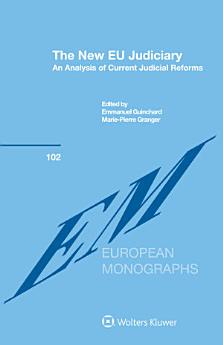The New EU Judiciary: An Analysis of Current Judicial Reforms
About this ebook
Broadening and deepening our understanding of the reorganisation of the EU Judiciary, the contributors offer incisive analyses of reforms and evolutions, including:
– a critical appraisal of the reform process and the role and powers of the CJEU; – implications of the reforms for the Court of Justice and the General Court; – lessons from the practice of the now dismantled Civil Service Tribunal; – a re ection on the future Uni ed Patent Court; – an evaluation of the role of the CJEU’s members and staffs and their selection; – an insider’s perspective into the workings of the repeat players (Legal Services of the European Commission and of the European Parliament) and the parties’ lawyers; – an assessment of the procedural reforms before the Court of Justice and the General Court with a speci c focus on the PPU; – the unfolding and impact of the digital revolution (e-Curia) on the CJEU; – the challenges of the languages regime and legal reasoning before the CJEU.Comparative perspectives elucidate speci c judiciary reforms across Europe, including detailed analyses of developments at the European Court of Human Rights, the French Conseil Constitutionnel, and the Supreme Court of the United Kingdom.
As a timely assessment of the effects of recent reforms on the EU Courts’ decision-making practices, roles, and identities, and more broadly on the legitimacy of the EU and its institutions as a whole, this book is unparalleled. It will be of great value to practitioners engaged in EU litigation, scholars of European law and policymakers at EU institutions, and all those interested in judicial process and reform.




